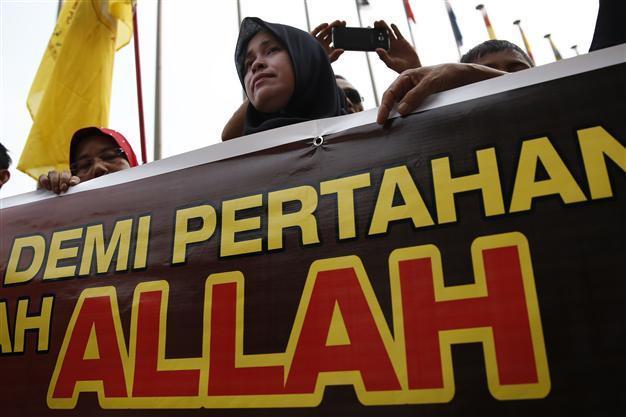Christians lose divisive bid to use 'Allah' in Malaysia
PUTRAJAYA, Malaysia - Agence France-Presse

A Muslim woman holds a banner reading "Allah" during a protest outside the Court of Appeal in Putrajaya, outside Kuala Lumpur, Malaysia, Monday, June 23, 2014. AP Photo
Malaysia's highest court on Monday dismissed a bid by Christians for the right to use the word "Allah", ending a years-long legal battle that has escalated religious tensions in the Muslim-majority country.
The divisive case, in which the Catholic Church challenged a government ban on its long-time use of the Arabic word to refer to God, came amid concern from minorities who feel their rights are under threat by rising Islamisation in the Southeast Asian nation.
The government had previously banned the use of "Allah" in the local Malay-language edition of the Church's Herald newspaper, which had angered Muslims, who say Christians are overstepping religious boundaries.
A seven-judge panel in the administrative capital Putrajaya ruled a lower court decision siding with the government stood.
"It (the Court of Appeal) applied the correct test, and it is not open for us to interfere," chief justice Arifin Zakaria said.
Analysts termed the ruling a "vote-winner" for the government.
S. Selvarajah, one of the church's lawyers, said his team would explore further ways to challenge the ban.
"It's a blanket ban. Non-Muslims cannot use the word. It has a major impact," he told AFP.
The Herald editor Father Lawrence Andrew said the judgement "didn't touch on the fundamental rights of minorities".
"We are greatly disappointed by this judgement," he said.
Outside the court, which was cordoned off, about a hundred Muslim activists cheered the news of the verdict.
Earlier, they had shouted "Allahu Akbar" or "God is great" and waved banners that read "Uniting to defend the name of Allah".
"I'm very pleased and happy that we have won the case. I hope the issue will be put to rest," Ibrahim Ali, head of Muslim rights group Perkasa, told AFP.
"We must defend 'Allah' because this is our religious obligation. I hope other communities, including Christians, understand this."
The dispute first erupted in 2007 when the Home Ministry threatened to revoke the publishing permit of the Herald for using the Arabic word in its Malay-language edition.
The Church launched a court case to challenge the directive, arguing "Allah" had been used for centuries in Malay-language Bibles and other literature to refer to "God" outside of Islam.
But authorities say using "Allah" in non-Muslim literature could confuse Muslims and entice them to convert, a crime in Malaysia.
In 2009 a court ruled in favour of the Church, sparking a spate of attacks on houses of worship. Last October, an appeals court reinstated the ban.
Malaysia has largely avoided overt religious conflict in recent decades, but tensions have been growing.
Two petrol bombs were thrown at a Malaysian church in January, causing minor damage.
Also in January, Islamic authorities seized hundreds of Bibles, which contained the word "Allah", from a Christian group.
About 2.6 million people among the Southeast Asian nation's 28 million people are Christians, who come from mostly ethnic Chinese, Indian or indigenous backgrounds, while 60 percent are Muslim ethnic Malay.
Prime Minister Najib Razak, who took office in 2009, has increasingly rolled back his initial reformist and conciliatory rhetoric in a bid to please hardliners of his United Malays National Organisation (UMNO), which has ruled the country virtually uninterrupted since 1957 independence.
James Chin, a political science professor at Monash University, said it was unlikely authorities would use the verdict to start seizing Malay-language Bibles and other literature containing the word "Allah" on a large scale or crack down on Malay-language church services.
"The idea is to use this as a political weapon to raise tensions," he told AFP. "They (the ruling party) feel that this is a vote-winner for the next election."
